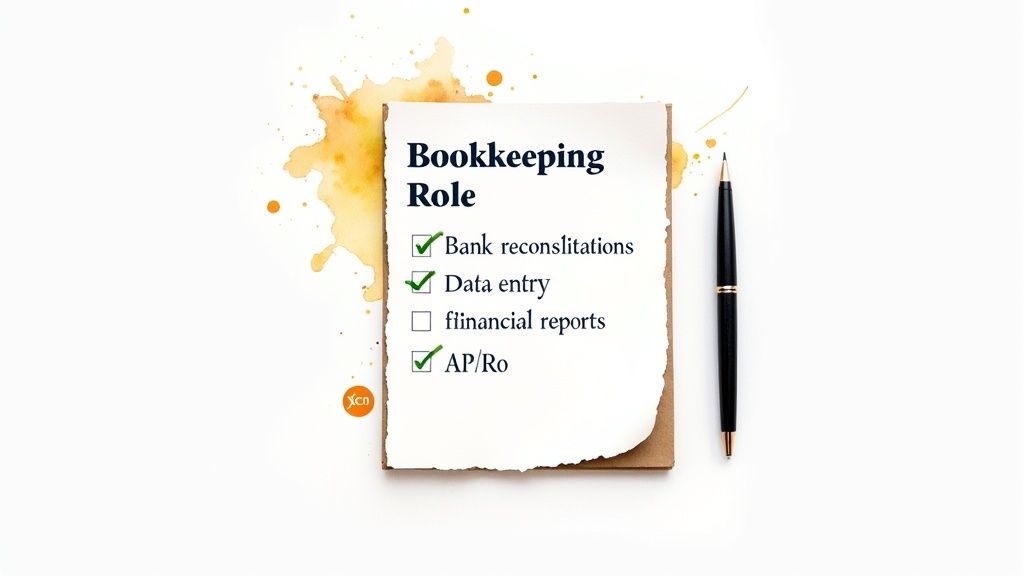Hiring a virtual assistant for your bookkeeping isn’t just about offloading data entry; it’s a strategic move that frees you up to actually grow your business. Think of it as gaining specialized financial expertise to keep your records pristine, compliant, and ready for analysis—all without the overhead of another full-time employee.
The Strategic Shift to Virtual Bookkeeping

Smart business owners are rethinking the old in-house model for financial management. They’re not just looking for a budget cut; they see bringing on a virtual bookkeeper as a genuine competitive advantage. This move is about becoming more agile and tapping into expert knowledge in one fell swoop.
The real win here goes far beyond just saving on a salary and benefits. It’s about getting access to a pool of specialized talent that, frankly, might be out of reach for most small or medium-sized businesses. You get a dedicated professional whose entire job is to keep your financial data accurate and organized—the very foundation of every good business decision.
Technology, especially the growing role of AI in accounting, has really accelerated this shift by automating repetitive tasks and boosting accuracy. With the right virtual partner, you can scale your financial operations up or down as needed, whether you need extra muscle during tax season or consistent support for monthly closes.
Why a US-Based Partner Is a Competitive Edge
Where your virtual bookkeeper is located is a bigger deal than you might think. Opting for a US-based partner brings some distinct advantages that have a direct impact on your company’s security, compliance, and day-to-day operations. This isn’t just about convenience; it’s a strategic choice for stability and peace of mind.
For starters, they have an inherent understanding of Generally Accepted Accounting Principles (GAAP). US-based pros are trained within this framework, which means your financial statements will be prepared correctly for lenders, investors, and any regulatory bodies looking over your shoulder.
By partnering with a US-based virtual bookkeeper, you eliminate the risks associated with misinterpreting complex American financial regulations, ensuring your business remains compliant and avoids costly penalties.
On a practical level, communication and collaboration are just easier. Working in the same or similar time zones means your financial pro is actually available during your business hours. They can jump on a quick call to address an urgent issue or join a team meeting without you having to deal with logistical nightmares.
The Growing Demand for Virtual Financial Expertise
This move toward virtual bookkeeping isn’t just a small trend; it’s a massive market shift. The global virtual bookkeeping services market was valued at USD 4.5 billion and is expected to rocket to USD 12.5 billion by 2032. What’s driving this? A huge demand for real-time financial data and flexible solutions, especially from small and mid-sized businesses that need to manage their finances efficiently without being bogged down by full-time hires.
This explosive growth points to a fundamental change in how businesses are thinking about their financial operations. The modern playbook is all about:
- Scalability: Adjusting your level of support based on your business cycles, without the friction of hiring and firing.
- Specialized Skills: Gaining access to true experts in platforms like QuickBooks, Xero, or whatever system you use.
- Data Security: Knowing your partner adheres to stringent US data privacy and security standards, which is critical when you’re dealing with sensitive financial information.
At the end of the day, bringing on a virtual assistant for bookkeeping helps you build a more resilient and efficient financial backbone for your company.
Defining Your Bookkeeping Needs and Must-Have Skills

Before you even think about posting a job ad, you have to get brutally honest about what you need. Hiring a virtual assistant for bookkeeping without a clear scope is like setting sail without a rudder—you’ll drift aimlessly and waste a lot of money. The first step is to map out exactly which financial tasks are eating up your time or, worse, being ignored completely.
Start by taking a hard look at your current workflow. Where are the logjams? Are you scrambling at the end of every month to reconcile bank accounts? Are invoices sitting in your drafts folder for weeks? The answers to these questions are the building blocks of a solid job description.
Getting this right from the start is crucial. It ensures you attract candidates who actually have the skills you need and avoids the painful process of hiring the wrong person.
Creating Your Bookkeeping Responsibility Checklist
A great way to approach this is to think in terms of daily, weekly, and monthly rhythms. This not only clarifies the role for you but also sets crystal-clear expectations for your new hire.
Just grab a notepad and start listing every single financial task you do—or should be doing. Don’t censor yourself; just get it all out.
Here’s a practical checklist to get you started on defining the core duties:
- Daily & Weekly Tasks:
- Transaction Entry and Categorization: Getting all income and expenses into your accounting software and coded correctly.
- Bank and Credit Card Reconciliation: This should be a regular pulse check, not a quarterly fire drill. It’s about catching errors early.
- Accounts Payable (AP): Managing vendor bills so you’re paying people on time and keeping your relationships strong.
- Accounts Receivable (AR): The lifeblood of the business—creating invoices, sending them out promptly, and chasing down late payments.
- Monthly & Quarterly Tasks:
- Financial Statement Preparation: Generating the core reports you need to make smart decisions, like the Profit & Loss (P&L), Balance Sheet, and Cash Flow Statement.
- Expense Report Management: Handling all the receipts and reimbursements for you or your team.
- Payroll Support: Making sure all the data is lined up and accurate for payroll runs.
By outlining these responsibilities, you shift from a vague feeling of “I need help with my books” to a concrete plan of action. This document becomes your north star during interviews and onboarding.
Hard Skills Versus Soft Skills: What Matters Most
Once you know what needs to be done, you can figure out who is the right person to do it. The best virtual bookkeepers have a powerful mix of technical know-how (hard skills) and rock-solid professional habits (soft skills).
When it comes to hard skills, some things are non-negotiable. If your entire business operates on QuickBooks Online, you can’t afford to hire someone who’s only ever used Xero. The time they’ll spend learning on your dime is time you don’t have.
But don’t overlook the soft skills. In a remote role, these are what separate a good bookkeeper from a trusted partner. You need someone who is a proactive communicator, obsessed with details, and organized enough to manage your finances from afar.
This is one area where working with a US-based outsourcing partner can give you a real edge. They’ve already vetted their people not just for their bookkeeping chops, but also for the communication style and cultural alignment that make remote collaboration feel effortless.
General VA vs. Specialized Bookkeeping Pro
Here’s a classic mistake I see business owners make: they hire a general virtual assistant and then try to pile on complex financial duties. A general VA is a lifesaver for managing your calendar or inbox, but they almost never have the deep knowledge required for accurate bookkeeping.
It’s a critical distinction. A specialized bookkeeper brings expertise that prevents costly mistakes and keeps you compliant. A generalist, on the other hand, can quickly get in over their head.
Let’s break down the real difference.
General VA vs. Specialized Bookkeeping VA
| Attribute | General Virtual Assistant | Specialized Bookkeeping VA |
|---|---|---|
| Primary Focus | Administrative tasks, scheduling, data entry, social media. | Financial record-keeping, reconciliation, reporting, and compliance. |
| Core Skills | Organization, communication, general software proficiency. | US GAAP, QuickBooks/Xero certification, financial analysis. |
| Strategic Value | Increases personal productivity and offloads daily admin work. | Ensures financial accuracy, provides data for strategic decisions. |
| Error Impact | Low to moderate (e.g., a scheduling mix-up). | High (e.g., incorrect financial statements, tax penalties). |
Ultimately, choosing a specialized bookkeeping VA isn’t just about outsourcing tasks; it’s an investment in the financial integrity of your business. You’re ensuring the person with access to your most sensitive data truly knows what they’re doing.
Finding and Vetting Your Ideal Bookkeeping Pro
Once you’ve mapped out exactly what you need, it’s time to find the right person for the job. But let’s be clear: searching for a top-tier virtual assistant for bookkeeping isn’t about just tossing a job ad into the void and hoping for the best. It’s a strategic hunt for a professional who has not only the right technical chops but also the rock-solid reliability your business finances depend on.
You’ll quickly find yourself at a crossroads with two main paths: freelance platforms and specialized VA agencies. Freelance sites like Upwork or Fiverr offer a massive, global pool of talent and can seem like a bargain at first. The catch? You’re on your own. The entire burden of vetting, running background checks, and truly verifying their skills lands squarely on your shoulders.
The Advantage of a US-Based Outsourcing Partner
This is where working with a specialized US-based agency can be a total game-changer. Think of them as your expert filter. They’ve already done the heavy lifting of vetting candidates, building a roster of professionals who are proven, skilled, and reliable.
Going this route provides a powerful layer of security and peace of mind. A good agency handles:
- Comprehensive Vetting: They’ve already run the background checks and confirmed that the certifications and software skills listed on a resume are legit.
- Compliance and Security: They get it. They operate under US data privacy laws, which is absolutely critical when you’re handing over the keys to your financial kingdom.
- Cultural and Time Zone Alignment: Communication is just easier. You’re not trying to sync up across a 12-hour time difference or navigate cultural communication gaps, meaning urgent issues get handled during your business hours.
This pre-vetted approach dramatically cuts down your hiring risk and frankly, saves you a ton of time. While it’s always smart to look at all your options, you can see how a structured approach to sourcing outsourced virtual assistants can streamline the whole process.
By choosing a US-based agency, you are not just hiring an individual; you are investing in a proven system of recruitment, management, and quality control that protects your business.
This partnership ensures the virtual bookkeeper you bring on board is a true professional ready to contribute from day one—not a gamble that could cost you precious time and money. If your needs go beyond bookkeeping into more complex financial management, you might find these tips for hiring remote accountants useful.
Your Interview Checklist for Real-World Competence
A sharp interview is your best tool for separating the real pros from those who just look good on paper. You need to move past the generic questions and get into real-world scenarios that test how they actually think and solve problems. You want to see how they operate, not just what they’ve memorized.
I always recommend starting with a quick skills assessment. It could be a short, practical test inside your accounting software, like asking them to find a specific report or categorize a few tricky transactions. This simple step can immediately weed out candidates who’ve, shall we say, “embellished” their expertise.
Once you’ve confirmed they can handle the basics, it’s time to dig into scenario-based questions that show you how they think on their feet.
Essential Interview Questions to Ask
- “Walk me through the process you would use for a month-end reconciliation. What specific steps do you take to ensure accuracy?”
- What to listen for: You’re looking for a systematic, step-by-step method. They should mention matching transactions, hunting down discrepancies, investigating mystery entries, and confirming the final balances. A great answer shows they have an organized workflow they can repeat every single month.
- “Imagine you discover a significant discrepancy while reconciling a bank statement. What is your immediate course of action?”
- What to listen for: This one is a test of their problem-solving and communication instincts. The right candidate won’t panic. They’ll describe a logical process: first, they investigate—checking for data entry errors, missing transactions, or timing issues—before bringing the issue to you with clear documentation.
- “Describe a time you had to clean up messy or disorganized books for a new client. What was your strategy?”
- What to listen for: This question reveals their strategic mind and organizational skills. A strong answer will touch on setting a cut-off date, prioritizing the most critical accounts (like banking and receivables), and communicating clearly with the client to get the information they need.
These kinds of questions push candidates beyond textbook answers, forcing them to show you how they’d handle the real-world messiness of the role. By focusing on these practical scenarios, you can confidently find a virtual bookkeeper who has the experience and judgment to be a true asset to your company.
Seamlessly Onboarding Your New Financial Partner

Finding the perfect virtual assistant for bookkeeping is a huge win, but it’s only half the battle. The real work of building a successful, long-term partnership starts now, during the first few weeks of onboarding.
Don’t make the common mistake of just handing over a bunch of logins and hoping for the best. That’s a surefire recipe for confusion, costly errors, and ultimately, a failed relationship. Instead, think of onboarding as the critical process of building a bridge between your business and your new financial pro. A thoughtful, structured approach ensures they understand not just what to do, but how and why your business does it.
This initial investment of time will pay for itself over and over again in efficiency, accuracy, and mutual trust.
Granting Secure Access to Financial Systems
First things first: you need to give your new bookkeeper access to the tools of the trade. But let’s be crystal clear—security is non-negotiable. Never, ever share your master passwords in an email or a chat message. It’s a massive security risk and a nightmare to manage if you ever part ways.
The only way to do this professionally is with a secure password manager like LastPass or 1Password. These tools let you share specific login credentials without ever exposing the actual password. You can grant access to your accounting software, bank feeds, and payment processors while keeping full control to revoke it instantly. This isn’t just a best practice; it’s essential for protecting your company’s financial data.
If you hire candidates through a reputable US-based agency, they’ll likely have rock-solid security protocols already in place and can walk you through this. It’s one of the major advantages of working with an outsourcing partner who takes data protection seriously from day one.
Establishing Clear Standard Operating Procedures
Think of your Standard Operating Procedures (SOPs) as the official playbook for your company’s finances. They eliminate guesswork and guarantee consistency, no matter who’s handling the books. Your virtual bookkeeper needs this playbook to get things right from the start.
Never assume they’ll just “figure out” how you like things done. Documenting your core processes is one of the highest-impact things you can do.
- Expense Categorization: Be specific. Create a simple chart or guide showing how to code common expenses. For example, all software fees go to “SaaS Subscriptions,” while taking a client to lunch is coded to “Meals & Entertainment.”
- Invoice Processing: Map out the entire journey of an invoice. Detail how it’s created, who needs to approve it, how it’s sent, and what the follow-up process looks like for late payments.
- Monthly Reporting: Clearly state which reports you need and when. “I need the P&L, Balance Sheet, and A/R Aging report by the 5th business day of every month.”
An SOP doesn’t have to be some fifty-page manual nobody will ever read. A simple checklist, a short Loom video walking through a process, or a shared Google Doc can be incredibly effective. The goal here is clarity, not complexity.
Creating a Communication Plan
When you’re working remotely, you can’t just lean over the cubicle wall to ask a quick question. That’s why a clear communication plan is so crucial. It sets expectations from the outset and prevents the small misunderstandings that can snowball into major problems.
Your plan should outline your preferred channels for different situations. For instance, you might decide that urgent issues get a phone call, day-to-day questions live in a dedicated Slack channel, and weekly updates are handled over email.
Here’s a simple rhythm you can adapt for your own business:
| Communication Type | Channel | Frequency | Purpose |
|---|---|---|---|
| Urgent Issues | Phone Call / Text | As Needed | For immediate attention on critical financial matters. |
| Daily Questions | Slack / Teams | Daily | Quick clarifications and process questions. |
| Weekly Check-in | Video Call | Every Friday @ 10 AM | Review progress, discuss challenges, and plan ahead. |
| Monthly Report Review | Formal Email | First Monday of Month | Delivery and review of finalized financial statements. |
By setting up this framework from day one, you build a professional and predictable working relationship. Your new bookkeeper will feel more connected, confident, and perfectly aligned with you and your business goals.
Measuring Success and Financial ROI

Once your new virtual assistant for bookkeeping is up and running, how do you know if the investment is actually paying off? Measuring success is about more than just looking at a lower monthly invoice. It’s about tracking tangible improvements and understanding the powerful, yet often overlooked, non-financial gains that truly drive business growth.
The first thing you’ll likely notice is the direct financial benefit. It’s often the most compelling reason to make the switch in the first place. Businesses that outsource bookkeeping can see cost savings of up to 78% compared to hiring a full-time, in-house employee. That’s a massive reduction, achieved by cutting overhead like salaries, benefits, and office space. You can get more details on the financial impact of virtual bookkeeping trends and see why it’s becoming so common.
But the real return on investment is a blend of these hard savings and the strategic value your new partner brings to the table.
Key Performance Indicators to Monitor
To get an objective look at performance, you need to track a few key performance indicators (KPIs). These metrics give you a clear, data-driven view of your virtual bookkeeper’s impact and the overall health of your financial operations.
Before they start, take a snapshot of your current numbers to establish a baseline. Then, track these figures each month or quarter to see how things are trending.
- Report Accuracy Rate: Keep an eye on the number of errors or revisions needed in your monthly financial statements. Your goal should be a consistent 99% or higher accuracy rate. Anything less means something is off.
- Time to Close the Books: How many business days does it really take to reconcile all accounts and generate final reports after a month ends? An experienced bookkeeper should systematically shrink this window, getting you critical data faster than before.
- Days Sales Outstanding (DSO): This is a big one. It measures the average number of days it takes for you to get paid after making a sale. A lower DSO means cash is flowing into your business much more quickly, a direct result of efficient invoicing and diligent follow-up.
The Bigger Picture Beyond Cost Savings
While KPIs provide a great tactical view, the most profound ROI often comes from benefits that you can’t easily plug into a spreadsheet. You have to think about the strategic value that gets unlocked when your financial foundation is solid and you’re finally free from the daily grind of bookkeeping.
This is where a partnership with a quality US-based outsourcing firm can make all the difference. They provide professionals who don’t just complete tasks; they understand the context of your business. That understanding leads to more insightful reporting and proactive communication, empowering you to make smarter, faster decisions with reliable data.
The ultimate ROI of a virtual bookkeeper isn’t just about the money you save—it’s about the opportunities you can finally seize because your time and focus are back on growing the business.
Think about the value of your reclaimed time. If you suddenly get back 10 hours a week, what is that time worth when you can redirect it toward sales, product development, or strengthening client relationships? On top of that, accurate and timely books help you avoid costly compliance penalties from missed deadlines or incorrect filings—a financial disaster you may not even see coming.
Real-World ROI: An E-commerce Store Scenario
Let’s put this into a real-world context. Imagine a growing e-commerce store that hires a virtual assistant for bookkeeping. Before making the hire, the owner was sinking 15 hours a week into managing transactions, reconciling Shopify payouts, and tracking inventory costs. It was a nightmare.
After just three months with their new bookkeeper, the results were unmistakable:
- Financial Impact: Their DSO plummeted from 45 days to just 20, improving their cash flow by thousands. Their report accuracy is now flawless, which helped them secure a better line of credit from their bank.
- Operational Impact: The owner reclaimed over 50 hours a month. They used that time to develop and launch a new marketing campaign that boosted sales by 15%.
- Strategic Impact: With clean, real-time data, they finally identified their least profitable product line. They adjusted their strategy and instantly boosted their overall profit margins.
In this scenario, the ROI is a powerful mix of direct cost savings, dramatically improved cash flow, new sales, and higher profitability—all stemming from one strategic hire.
Answering Your Top Questions About Virtual Bookkeeping
Bringing on a virtual assistant for your bookkeeping is a big decision. I get it. You’re thinking about handing over the keys to your financial kingdom, and it’s only natural to have a few questions before you do. Most business owners I talk to have the same core concerns, from data security to cost.
Let’s cut through the noise and tackle these questions directly. My goal is to give you the practical, no-nonsense answers you need to feel confident in making this move.
How Can I Be Sure My Financial Data Is Secure?
This is always the first question, and it should be. The idea of your sensitive financial data being “out there” is unsettling. But here’s how a true professional handles it.
A reputable US-based virtual bookkeeper will never ask you to email a password. That’s a massive red flag. Instead, they use secure, encrypted password managers like LastPass or 1Password. This gives them the access they need to work in your accounts without ever actually seeing your login credentials.
Working with a US-based firm gives you an extra layer of security. They’re bound by American data privacy laws, which provides a level of legal accountability you just don’t get when hiring an independent freelancer overseas.
These professionals are trained in confidentiality and operate on secure networks. They live and breathe this stuff. It’s their job to protect your information as fiercely as they protect their own.
Is It Really Cheaper Than an In-House Hire?
In a word, yes. The savings aren’t just about the hourly rate; they’re about the total cost of employment.
When you bring on a full-time employee, the salary is just the starting point. You’re also on the hook for payroll taxes, health insurance, retirement plans, paid time off, and the overhead for their desk, computer, and software licenses. It all adds up—fast.
A virtual bookkeeper completely changes the math. You pay for productive work, and that’s it. This model is incredibly flexible. You can scale services up during tax season or pull back during a slow quarter without the headache of hiring and firing.
Let’s look at a simple breakdown:
| Cost Factor | Full-Time In-House Employee | US-Based Virtual Bookkeeper |
|---|---|---|
| Salary/Hourly Rate | Fixed annual salary, regardless of workload | A predictable hourly or monthly fee |
| Benefits | Health insurance, 401(k), etc. | Not your responsibility |
| Payroll Taxes | Employer contributions are mandatory | Not your responsibility |
| Overhead | Office space, equipment, software | Zero |
| Paid Time Off | Vacation, sick days, holidays | Not applicable |
The financial argument is pretty compelling. You get access to top-tier expertise without the hefty financial baggage of a traditional employee, which frees up cash for you to invest back into the business.
What if the Person I Hire Isn’t a Good Fit?
This happens, and it can be a huge headache. A bad fit in a bookkeeping role doesn’t just slow things down; it can create costly messes that take weeks to untangle.
If you hire a freelancer on your own, you’re the one who has to manage the fallout. You have to have the awkward conversations, revoke access, and then start the entire frustrating search process all over again.
This is where partnering with a quality US-based outsourcing agency really shines. Their reputation is on the line, so they are just as invested in a successful match as you are. If the bookkeeper they assign isn’t clicking with your team or workflow, they don’t just walk away.
A good agency has a deep bench of vetted talent. They can quickly and seamlessly swap in another qualified professional, often without any disruption to your day-to-day operations. This safety net is invaluable—it gives you continuity and saves you from the stress of going back to square one.
Ready to get financial clarity and reclaim your time? NineArchs LLC offers expert, US-based virtual assistants for bookkeeping who are prepared to manage your books with the accuracy and professionalism your business deserves. Stop drowning in spreadsheets and start focusing on growth. Find out more about our scalable solutions.
Article created using Outrank









